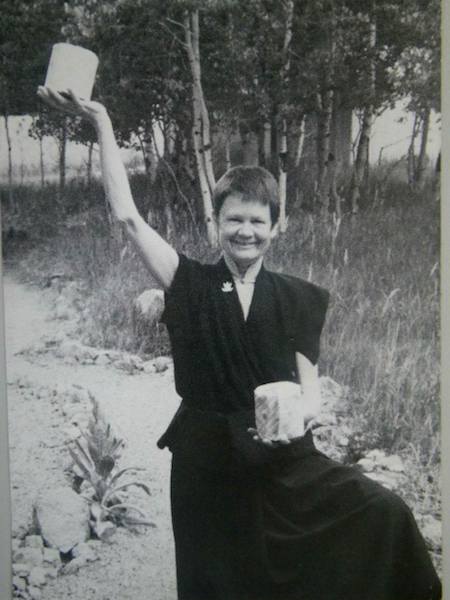Pema Chödrön, the Rockstar Nun, made this enlightening statement to an audience at Shambhala Mountain Center for the first Shambhala Sangha Retreat in 2009.
“There’s nothing more important on our spiritual path than developing gentleness to oneself.”
This key practice translates into gentleness toward others and will result in a more meaningful and fulfilling life that will benefit ourselves and our world.
A sangha, or community of practitioners, trains to realize the quality of basic goodness (a fundamental underlying feeling of sanity and well-being) by working with the powerful, transformative practice of gentleness.
Pema explains that the only obstacle preventing our experience of this holistic goodness is harshness and aggression to ourselves. This harshness prevents our naturally existing seeds of love and compassion from growing.
The seed is there, Pema states, but it requires the right causes and conditions to come to fruition. And although gentleness to ourselves translates into creating an environment of gentleness, the opposite is true when we are practicing harshness to ourselves.
We have to be careful to not allow our own meditation practice to be further ammunition, as Pema puts it, for harshness to ourselves. We do this by how we judge ourselves when we are constantly ruminating over trivial events during our sitting session, or feeling irritated, jealous, or fearful for the millionth time about a story that keeps hooking us.
Instead, we can begin to develop an unconditional love for ourselves—no matter what comes up we will always love our self.
Another aspect of gentleness, and where strength comes in, is discipline. Allowing ourselves to indulge in bad habits is not practicing gentleness. Part of practicing kindness and gentleness, Pema explains, is giving ourselves a break from habitual thinking and patterns. Thinking isn’t bad in itself, of course, but it can be abused when we use it as a distraction from experiencing our lives.
“We’re always exiting and its thoughts that take us away.”
The path for pacifying these suffering causing habits is totally accepting and appreciating whatever arises, and realizing that “getting off the hot seat just leads to more hot seats.”
So, the pith instruction is to:
1. Change our attitude so that we become more gentle with ourselves.
2. Make friends with the uncomfortable pain we’ve been avoiding. (This is very hard, of course, and takes a lot of practice.)
We are trying, as Pema put it, to open ourselves to our lives—all of it.
We can begin to lean-in to the sharp edges by taking baby steps. Start, Pema says, by just puncturing the discursiveness (when you’re really caught up in something) with three conscious breaths…and then go back to fuming. And just keep doing that. We’re training our heart to be able to hold it all.
The more we begin to settle into that feeling of basic goodness and the more time that is part of our everyday experience, the less jarring the big emotional upheavals are. The mistake is thinking that we will never experience the painful emotions once we’ve achieved some imagined spiritual level.
There will always be moments of rage, sorrow, and the rest of it. But, if we can lean into, and open to, all of it, those moments will be fleeting and we may even begin to appreciate them as part of the human experience.
We can begin to experience gentleness in our selves by the shift in perspective and experience that comes from sitting meditation. It seems to be largely depending on how much we can let go, relax, and appreciate our lives.
Aggression is conceptual, it’s judgmental, and it’s like punching ourselves in the face. In working with the technique during meditation, we are repeatedly letting go of whatever comes up and learning to relax and appreciate what’s there naturally. We’re learning that judgments are unhelpful and we can just let them go when they arise.
Gentleness is soft and strong at the same time. It’s like water. It’s also subtle and intimate. Gentleness is always moving forward, always noticing, always interested—the genuine heart of sadness.
“The genuine heart of sadness comes from feeling that your nonexistent heart is full. You would like to spill your heart’s blood, give your heart to others. For the warrior this experience of sad and tender heart is what gives birth to fearlessness. Conventionally, being fearless means you are not afraid or that if someone hits you, you will hit him back. However, we are not talking about that street-fighter level of fearlessness.
Real fearlessness is the product of tenderness. It comes from letting the world tickle your heart, your raw and beautiful heart. You are willing to open up, without resistance or shyness, and face the world.
You are willing to share your heart with others.”
~ Chögyam Trungpa (from Shambhala: The Sacred Path of the Warrior)



Read 10 comments and reply